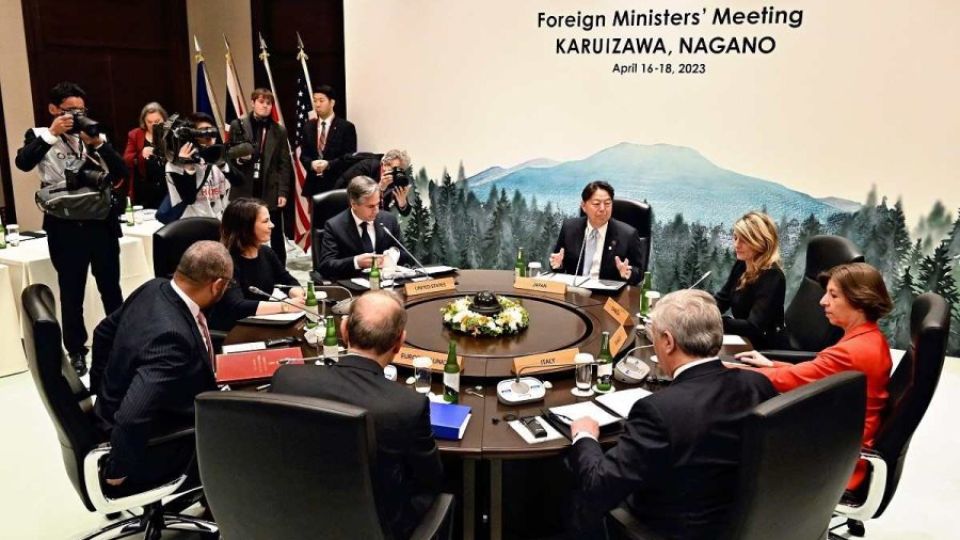April 19, 2023
TOKYO – The foreign ministerial meeting of the Group of Seven nations held in the resort town of Karuizawa, Nagano Prefecture, has become an opportunity for member states to reaffirm their heightened involvement in the Indo-Pacific region, where China is stepping up its acts of hegemony.
It is essential for the G7 nations, which share fundamental values, to closely work together to uphold the international order based on the rule of law.
As the chair of the meeting, Japan focused its efforts on conveying to the rest of the world that the G7 countries are united in handling the situation in the Indo-Pacific region.
At the Indo-Pacific session on Monday, the second day of the G7 meeting, Japan’s Foreign Minister Yoshimasa Hayashi said Japan has a policy of firmly rejecting unilateral attempts to change the status quo anywhere in the world. Other participants concurred.
In addition to Russia’s invasion of Ukraine, China continues its attempts to change the status quo by force in the East China Sea and the South China Sea. For this reason, it is important to confirm with G7 members from Europe, which is geographically distant from Japan, the awareness that security in Europe is inseparable from security in the Indo-Pacific.
Acting on its own discretion as the meeting’s chair, Japan raised the Indo-Pacific issue as the first agenda item at the working dinner on Sunday night and the session on Monday morning.
“The Ukraine situation is certainly important, but we decided to also focus on the Indo-Pacific, as the meeting is chaired by Japan, which is the sole member from Asia,” a senior Foreign Ministry official said.
G7 foreign ministers spent about three hours and 20 minutes over two days holding in-depth discussions on responses to China and North Korea, as well as how to cooperate with like-minded countries, including India and members of the Association of Southeast Asian Nations.
Opportunity to mend divide
Japan’s insistence on raising Indo-Pacific issues at the G7 meeting was spurred by concern that disarray among the member states could trigger adventurism by China, which does not rule out the possibility of employing force to unify Taiwan.
French President Emmanuel Macron visited China earlier this month. After a meeting with his Chinese counterpart Xi Jinping, Macron reportedly said that the worse thing would be for Europeans to think that they must be followers of the United States. His remarks sparked international controversy.
The foreign ministerial meeting provided a prime opportunity to correct the situation, which Russia and China might view as a divide among G7 members. German Prime Minister Annalena Baerbock said new fissures among the G7 should be avoided.
During talks on Sunday, French Foreign Minister Catherine Colonna said France has deep feelings about maintaining peace and stability in the Taiwan Strait. She also said her country is opposed to unilateral attempts to change the status quo by force and seeks a peaceful resolution of the cross-strait issue. Her remarks apparently were intended to eliminate concerns over France’s position.
Hayashi proposed making discussions related to the Indo-Pacific a regular part of the G7 framework, and other members expressed their support. The proposal was intended to secure opportunities to hold continued discussions on issues in the region.
Hayashi told reporters on Monday that fulfilling discussions took place, suitable to a foreign ministerial meeting held in the Asia-Pacific region.
Concerning the Taiwan situation, he said the G7 nations completely agreed on seeking a peaceful resolution of the cross-strait issue.

